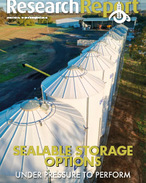This article is 1 year old. Images might not display.
Agriculture Victoria is reminding contractors and farm staff that regardless of the contractor's expertise in spraying, windrowing, harvesting, transporting, or storage, it's essential biosecurity standards are included and agreed to as part of the contracting process.
Agriculture Victoria's Grain's Industry Biosecurity officer, Jim Moran, said by including clear and precise wording in the contract it can minimise assumptions about the biosecurity activities to be undertaken, how they will be done, what proof is required, and what penalties apply if they aren't observed.
"Contractors should be committed to maintaining biosecurity practices that protect both your business and theirs from the risk of biosecurity events," Moran said.
Essential contractor responsibilities include:
• meeting all state-based quarantine requirements and general biosecurity obligations
• training their staff in biosecurity awareness and procedures
• arriving clean and leaving clean
• supplying agreed-upon evidence (written or photographic) of pre-arrival cleanliness and pre-exit cleanliness of all their machinery and equipment
• signing in and signing out all staff, equipment, and machinery.
Quotes from contractors should consider:
• the time required for cleaning before arrival on property
• the time required for cleaning before departure from the property
• fees and charges relating to required biosecurity documentation and inspections when travelling interstate.
Property owners should consider providing contractors with the location of suitable washdown areas and cleaning equipment to clean footwear, machinery and equipment appropriately.
"Have the conversations about biosecurity with contractors early and often to avoid non-compliance with your farm biosecurity expectations. Make it impossible to fail to prevent any nasty surprises," Moran said.
"It's important for grain growers and all land managers to take ownership of biosecurity at their farm. It's no longer unusual to have conversations about biosecurity with people, before they enter the farming property."
Farmers are also encouraged to place a biosecurity sign at the farm's main gates, as a reminder that biosecurity matters and is everyone's responsibility.
Grain Producers Australia (GPA) chair, Barry Large, said everyone needs to stay vigilant on biosecurity to help protect vital grain market access and safeguard farm businesses against damaging pests and diseases.
Large said the Australian Custom Harvesters Association, which represents professional contract harvesters across Australia, included biosecurity in recommended standard contracts with a pragmatic and common-sense approach.
"GPA supports this approach, with biosecurity terms included in contracts, when engaging a contractor to work on your farm," Large said.
For free biosecurity gate signs, Farm Biosecurity Manuals, Monitoring Grain Storage Manuals, and biosecurity fact sheets, please contact Agriculture Victoria on 136 186.
Other biosecurity resources, tactics and other information can be found here:
https://grainsbiosecurity.com.au
www.planthealthaustralia.com.au/biosecurity/
www.farmbiosecurity.com.au/























